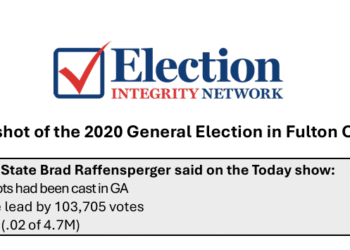BOTTOMLINE: Kamala Harris’s energy plan, modeled after California’s struggling system, raises concerns about energy shortages, high costs, and reliance on imports, as discussed by Dave Walsh and Dave Brat on the WarRoom. While aiming for green energy, the strategy benefits political interests rather than consumers, with parallels drawn to Europe’s continued dependence on Russian oil.
California’s Energy Crisis: Limit Energy from 4:30 PM-9:00 AM
California’s green energy policies, driven by an aggressive push toward solar and wind power, have resulted in severe energy shortages. Energy expert Dave Walsh explained to Dave Brat on Thursday’s WarRoom, saying, "Between 4:30 PM and 9:00 PM, there is no solar power, and demand skyrockets.”
The state’s reliance on solar energy, which does not operate during critical evening hours, has created a significant gap in electricity supply. As a result, rolling blackouts have become common, with Californians facing increasing inconvenience and higher energy bills.
Walsh emphasizes that this problem is not new but the result of years of environmental activism and poor policy decisions. “For years, I’ve been forecasting this outcome,” he states, pointing to the abandonment of nuclear and gas-fired power plants in favor of renewable sources that cannot meet the state’s demand.
The High Cost of Importing Energy: A Hidden Burden
During the segment with Walsh, Brat highlighted the financial burden placed on Californians due to the state’s decision to import around 40% of its electricity from neighboring states like Nevada, Oregon, and Arizona. Brat questions the political motives behind this move, suggesting it’s more about appearances than practical solutions.
“They’re importing 40% of their energy needs to look good to Democrats,” Brat asserts, linking the policy to political posturing rather than serving the public interest. This energy importation increases costs, as California has no control over the pricing from out-of-state providers. As Walsh adds, “California’s Public Service Commission cannot regulate the cost of imported energy, leaving the state at the mercy of neighboring states who charge premium rates.”
This raises an essential question: Who benefits from this policy? It appears that political elites and corporate interests profit, while ordinary Californians suffer from rising energy costs and unreliable power.
Kamala Harris’s Energy Vision: A National Crisis in the Making?
Democrat Presidential candidate, Kamala Harris, who has long supported green energy policies, has advocated for expanding California’s energy model across the country. During Tuesday’s ABC debate, her platform emphasized a national transition to renewable energy sources, similar to California’s approach. However, as Brat notes, she was not fact-checked on the real consequences of this strategy. If Harris’s plan mirrors California’s model, the country could face similar energy shortages, higher costs, and an over-reliance on importing energy.
Walsh raises an alarming parallel, asking, "Where will we get our energy from under Kamala’s plan? From Russia?” This mirrors Europe’s situation, where, despite sanctions, many Western countries continue to import oil from Russia, funding the very government they claim to oppose in the Ukraine war. Walsh states, "Western Europe is still heavily dependent on Russian energy, paying for the war effort despite their public claims.” The hypocrisy in Europe’s energy policy highlights the danger of adopting California’s flawed model nationwide.
Dirty and Dangerous: The Energy Hypocrisy
Walsh also critiques the labeling of nuclear, coal, and gas as “dirty and dangerous” by environmental activists, a stance that has led to the shutdown of numerous power plants in California. "They’ve deemed nuclear and gas dirty, but guess what? They’re importing coal-fired power from other states while claiming to be green,” Walsh remarks. This irony underscores the hypocrisy of California’s energy policy: while banning domestic production of reliable energy sources, the state continues to import "dirty” energy from elsewhere. This raises questions about the sincerity of Kamala Harris’s green energy ambitions, especially if they result in a similar reliance on out-of-state or even foreign energy sources.
Parallels Between California and Europe: A Warning for the U.S.?
Brat and Walsh’s discussion draws a direct parallel between California’s dependence on imported energy and Europe’s reliance on Russian oil. Despite being one of the wealthiest states with ample resources, California’s misguided energy policies have left it vulnerable to external suppliers. As Brat emphasizes, "California is importing energy they could produce themselves.” This situation mirrors Europe’s energy crisis, where countries continue to import energy from Russia despite publicly opposing its actions in Ukraine.
If Kamala Harris’s plan for the nation follows this model, serious concerns about the future of U.S. energy independence will be raised. As Walsh and Brat suggest, this reliance on foreign and out-of-state energy sources could compromise national security, increase costs, and undermine the supposed environmental benefits of green energy initiatives.
Will Kamala Harris’s Plan Benefit Americans or Political Interests?
The energy debate highlights the real consequences of policies like those Harris advocates: energy shortages, higher costs, and dependence on imports. While Harris may not have been fact-checked on her energy vision during the debate, the facts on the ground in California serve as a cautionary tale for the rest of the country. As Walsh asks, "Where will we get our energy from under Kamala’s plan?” The answer may not be what Americans want to hear.
Watch the entire interview with Dave Walsh from Thursday’s WarRoom:





